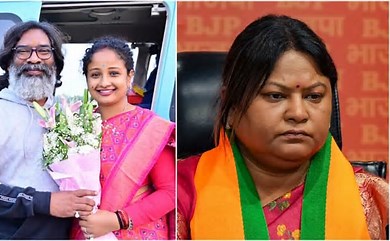New Delhi: The Hemant Soren-led Jharkhand Mukti Morcha and the I.N.D.I Alliance created history in Jharkhand by becoming the first party to be voted back to power in the tribal state. The bloc, which consisted of JMM, Congress, Rashtriya Janata Dal, and the Communist Party of India (ML), won 56 of the 81 Assembly seats that went to the polls. The JMM had contested 43 seats, Congress 30, RJD seven, while the CPI four seats, and they won 34, 16, four, and two seats, respectively.
The BJP’s failure to repeat the electoral trend in the state, where voters typically remove the incumbent every election, came despite a high-octane campaign spearheaded by Union Minister Shivraj Singh Chouhan and Assam Chief Minister Himanta Biswa Sarma. The issue of illegal Muslim immigrants settling in Jharkhand and impacting demographic change was one of the BJP’s biggest poll planks.
Clearly, as the results showed, the BJP’s focus on raising emotive issues—what certain sections of the voters also saw as a “divisive” campaign—rather than exclusively emphasizing the development it has brought by being in power at the Centre, and the further development it promised if voted into power in the state, could not overcome the work done by Soren in the last five years. The BJP was reduced to a poor 20 seats of the 68 it contested, five less than what it won in the last election. Its ally, the AJSU won one of the 10 seats it contested.
Soren’s stature among the voters increased significantly after he was arrested by the Central agencies, kept in custody for five months, and then released on bail by the court.
The win for the JMM-led I.N.D.I.A bloc, even for BJP insiders, has not come as a surprise, as feedback from local agencies and state leadership before the elections were announced, had suggested that the BJP may struggle to gain power in Jharkhand’s upcoming Assembly elections.
Among the reasons, apart from his arrest—which is likely to be considered a political mistake in the history books—Soren’s focus on implementing a range of financial schemes and his commitment to executing more governance and job-related initiatives if voted to power created a favourable situation
In the last election, the JMM had contested 43 seats and won 31, the Congress had contested 31 seats and won 16, while the RJD contested seven seats but won only one, indicating the important role the JMM played in the alliance’s return to power. I.N.D.I.A bloc leaders had told The Sunday Guardian before the election results that their victory, if it occurred, would be solely due to Soren’s popularity and schemes, rather than other leaders.
Among the schemes that raised the recall value of Soren when the voters went to the polling booth include Jharkhand e-Kalyan Scholarship under which financial support for SC, ST, and OBC students pursuing higher education was given; Tejaswini Yojana that provides vocational training and small business support for young women; Mukhya Mantri Sukanya Yojana which gives financial support for girls from birth to education completion; Mukhyamantri Rajya Vridhavastha Pension Yojana which gives monthly pensions to elderly citizens, especially women, tribals, and Dalits; Guruji Student Credit Card that allows collateral-free education loans for students and the policy of loan waiver for farmers under which nearly 177,000 farmers and their family members were benefited.
While Hemant Soren was in prison, his wife Kalpana, who also contested the election and won, became the face of the party and a household name in the tribal areas. She conducted over 100 public rallies, which helped the JMM create a strong connection with women voters. According to the data, of the 29 seats where women voters outnumbered men, the I.N.D.I Alliance won 28 of them.
The BJP also suffered as there was not a single local leader whom the voters could identify to compare with Soren. The entire BJP campaign was executed wholly by Chouhan and Sarma. While former CM Babulal Marandi tried to present himself as the CM face, this narrative did not get any traction due to the lack of support from the central leadership, which had stated that the CM would be announced after the results were declared. The party inducted senior JMM leader and former CM Champai Soren to get tribal support, but that went against the party as the voters found this decision by Champai as an example of opportunistic politics.
Champai was expected to help the BJP in the 14 seats of the Kolhan region, spread across the districts of East Singhbhum, West Singhbhum, and Seraikela-Kharsawan, of which nine are Scheduled Tribe (ST) seats, and the tribal population is 42%.
However, his entry did not make a significant impact for the BJP.
The NDA managed to win three seats in the Kolhan region—Saraikela, where Champai himself was contesting. His son, Babu Lal Soren, who contested from Ghatshila, lost the election. The other two seats won by the NDA were Jamshedpur East, where Purnima Sahu, the daughter-in-law of former BJP CM Raghubar Das, contested, and Jamshedpur West, where JDU candidate Saryu Roy contested.
In 2019, the JMM had won 11 of these 14 seats, with the BJP failing to secure any.
Reports from the ground had indicated that the emotive issues that the BJP had been raising were not being accepted by the voters, for which these narratives were meant to be, but these reports were ignored by poll managers while attributing these as “unreliable”.
Additionally, observers noted that the 2016 decision by former BJP CM Raghubar Das to amend the Chotanagpur Tenancy Act, 1908 (CNT Act), as well as the Santhal Parganas Tenancy Act, 1949 (SPT Act), aimed at addressing issues related to land acquisition for industrialization and development, was viewed as an anti-tribal move in a state where more than 27% of voters are tribals. The anger among the community has not yet dissipated, which has further impacted the BJP in this poll.
Soren creates history with re-election in Jharkhand
इस शब्द का अर्थ जानिये
- Advertisement -

